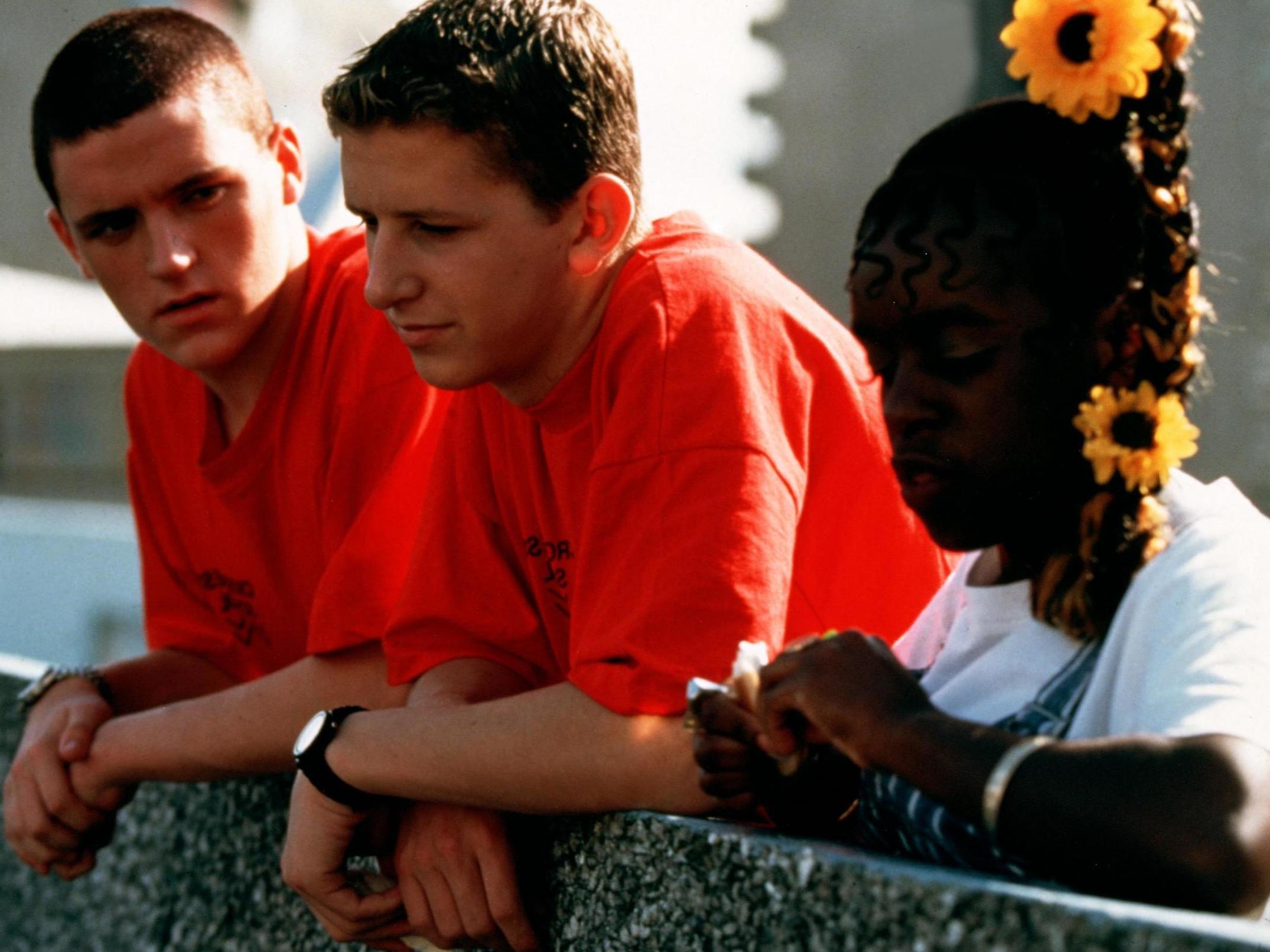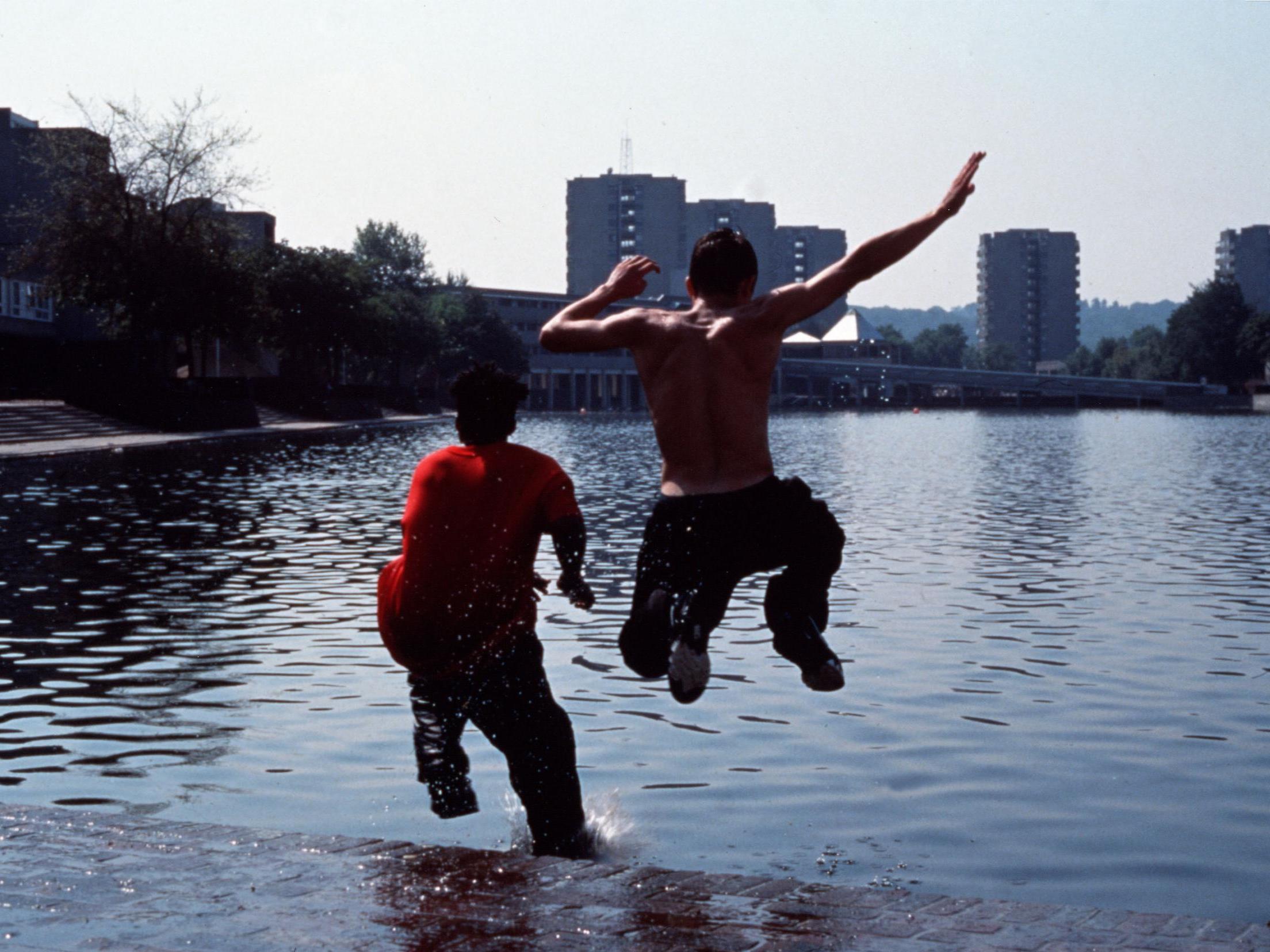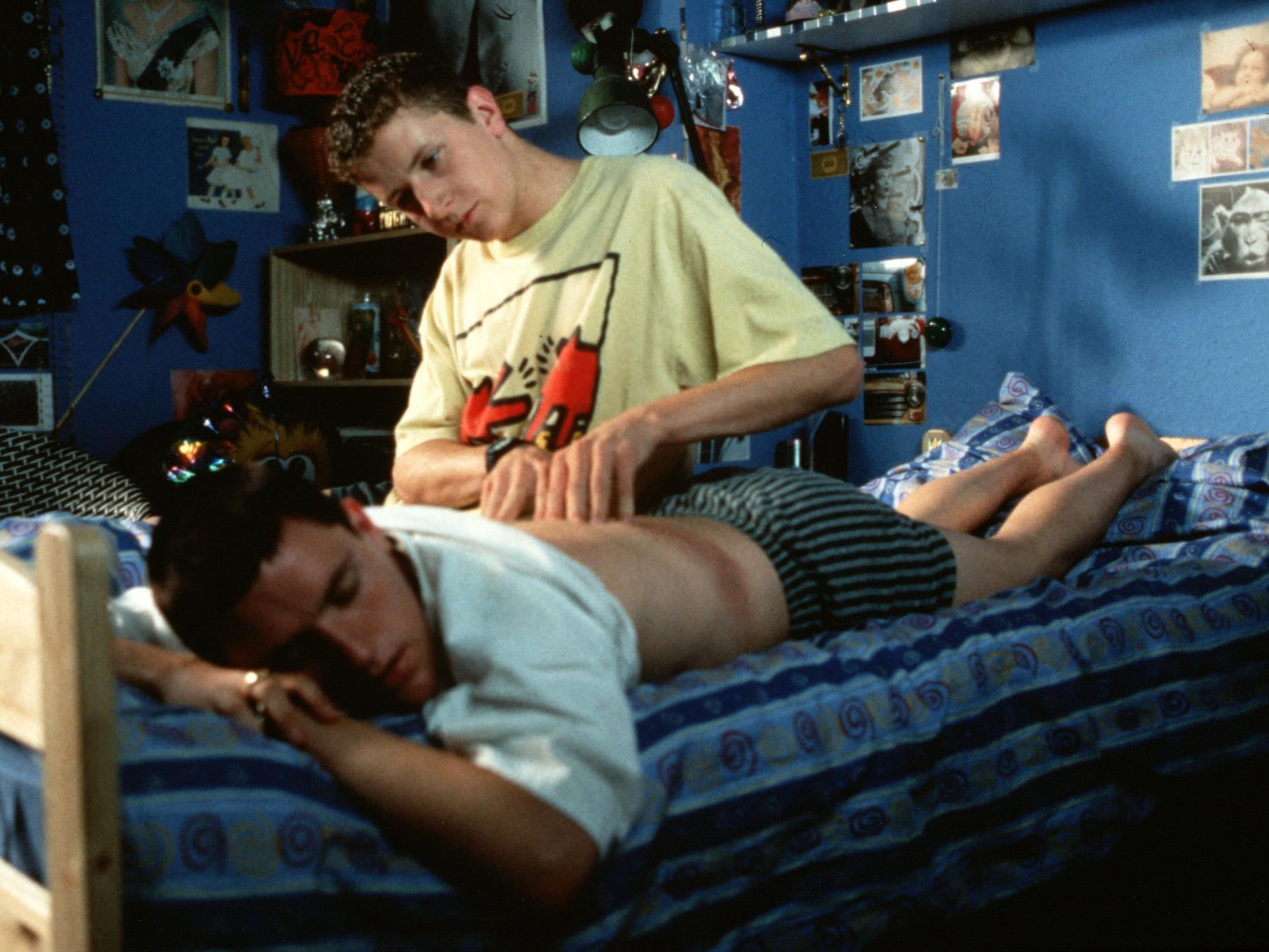Beautiful Thing: Why you should watch Normal People director Hettie Macdonald’s forgotten queer masterpiece
Following on from the kitchen-sink films of the Fifties and Sixties, both queerness and working-class life have tended to look bleak and depressing, writes Annie Lord. But Macdonald fills her first film with colour


Your support helps us to tell the story
From reproductive rights to climate change to Big Tech, The Independent is on the ground when the story is developing. Whether it's investigating the financials of Elon Musk's pro-Trump PAC or producing our latest documentary, 'The A Word', which shines a light on the American women fighting for reproductive rights, we know how important it is to parse out the facts from the messaging.
At such a critical moment in US history, we need reporters on the ground. Your donation allows us to keep sending journalists to speak to both sides of the story.
The Independent is trusted by Americans across the entire political spectrum. And unlike many other quality news outlets, we choose not to lock Americans out of our reporting and analysis with paywalls. We believe quality journalism should be available to everyone, paid for by those who can afford it.
Your support makes all the difference.In a summer where we have to stay inside, watching Normal People’s Connell (Paul Mescal) and Marianne (Daisy Edgar-Jones) eating fig salads next to swimming pools in rural Italy is beautiful torture. More than 16.2 million people tuned in to watch the BBC adaptation of Sally Rooney’s Booker prize-nominated novel in its first week; 139,000 now follow an Instagram account dedicated solely to Connell’s “Argos chic” chain. With its frank depictions of the mouth-chewing anxieties of first love, high-school bullies and university seminar snobs, Normal People has surpassed The Wire to become everyone’s favourite thing to shout at you for not watching.
Much was made of Room director Lenny Abrahamson’s work on the series – but he only directed half of the episodes. Hettie Macdonald was responsible for the rest, and is just as much a part of piecing together those gut-punching, painful sex scenes that made us all send regrettable “miss you” texts to our exes. Normal People’s popularity has brought a newfound attention to Macdonald, who’s known for making the most popular Doctor Who episode of all time (“Blink”), but has done so much more than that. Through a mix of tender but rough-edged realism, Macdonald makes social dramas that make you care about characters as if they were your friends. Back in 1996, she made Glaad award-winning queer classic Beautiful Thing, a love story about working-class teenagers Jamie (Glen Berry) and Ste (Scott Neal), who live next door to each other on a postwar southeast London council estate.
Since Beautiful Thing, Macdonald has faced a number of setbacks. As early as 1996, she was working on a film adaptation of Patricia Highsmith’s sapphic novel The Price of Salt, later adapted by Todd Haynes into 2015’s Carol, but the script was dropped. In 2001, she was said to be directing a romcom with Winona Ryder, but the actor left the project unexpectedly and it never got made. She did helm the acclaimed new miniseries Howards End, a wonderfully naturalistic adaptation scripted by Kenneth Lonergan, but Beautiful Thing remains a cinematic one-off – one that is as beautiful as its name suggests.
Written by Liverpudlian Jonathan Harvey, Beautiful Thing was originally a theatre production, which Macdonald directed for London’s Bush Theatre and its subsequent West End run. After the play won five-star reviews and a John Whiting award, Channel 4 asked Macdonald to adapt it into a film – despite the fact she’d never even been on a set before. What followed is one of the most beloved gay-youth movies of the Nineties. “This movie got me through high school,” wrote one fan on Reddit. “It made me realise I was normal, or not normal but being not normal is normal,” said another.

Beautiful Thing follows Jamie and Ste as they navigate the difficulties of growing up gay and working class in a society that rarely values anyone who is either. Ste’s drug-dealing brother beats him up. His dad is an alcoholic who makes Ste cook for him, telling his son his bubble and squeak “looks like fried s***”. Jamie’s mum Sandra (Linda Henry), a pub manager, is dating a washed-up, weed-smoking hippie half her age who says things like: “I saw a video about Woodstock once.” And at school, Jamie is bullied for being an oddball outcast who can’t play football. Next door is Leah (Tameka Empson), a young black woman who has been expelled from school and spends lots of her free time taking drugs and groaning about how “there’s f***-all to look forward to”. In this environment, it’s hard for Ste and Jamie to be happy – and that’s before anyone finds out they are gay.
Following on from the kitchen-sink films of the late-Fifties and early-Sixties, social realism has tended to look bleak and depressing. You see this in the shadowy corners of Mike Leigh and the sparse flats of (pre-America) Andrea Arnold, where miserable greys, blues and muddy beiges mirror the fatalistic trajectories of characters left with no hope of happiness. But right from the rainbow which bends past the concrete tower blocks during the opening titles, Beautiful Thing is bursting with colour. Yellow sunflowers twist through Leah’s plaited hair. Green and purple plants crawl out of the estate’s hanging baskets and flower beds. There are mermaid-green sequins on the drag queen’s dress, which glint with the orange glow from the local gay pub.
Around the time of the film’s release, Macdonald said she used colour as a way of bringing joy to the film, but that she didn’t want this detracting from the naturalistic atmosphere. “The decor is brightened, but only subtly,” she told MIT Press back in 1996, “because you still have to believe that these are real people and real lives. We needed to hang on to grittiness. It came down to little details like choosing to make the school uniforms red and not grey, choosing to decorate the flat with bright wallpaper rather than s****y stuff. Choosing to film some scenes by the lake, instead of some more sterile part of the environment. All these things together tend to heighten and brighten the realism.”
Perhaps the best part of Beautiful Thing, and also Macdonald’s work on Normal People, is her deft hand for highlighting the tiny intricacies that make up intimacy. After seeing Jamie’s bruises from another fight with his brother, Ste gets him to lie down in bed while he massages his mum’s Body Shop peppermint foot lotion into his back. “Cold, innit?” Jamie smiles as Ste winces. “Have you ever kissed someone, stuck your tongue in?” he asks. The answer is no and there follows a silence while they lay next to each other in bed, until Jamie leans over and pecks him. They turn the fairy lights off, but you can see the whites of their eyes in the dark as they try and fail to fall asleep. You get the feeling they think they shouldn’t have done that. You get the feeling they want to do it again.

Shame changes to pride after Ste and Jamie go to a drag bar. After laughing as a queen serenades them with the words “I feel like chicken tonight”, they run through a forest on the way home to Mama Cass’s gleeful, frenetic singing: “But you gotta make your own kind of music/ Sing your own special song/ Make your own kind of music/ Even if nobody else sings along”. Jamie pushes Ste against a tree and they kiss like teenagers, both moving to different rhythms. Teeth bashing. Too much tongue. But under the navy sky and in their stomachs, it is beautiful.

Watch Apple TV+ free for 7 days
New subscribers only. £8.99/mo. after free trial. Plan auto-renews until cancelled

Watch Apple TV+ free for 7 days
New subscribers only. £8.99/mo. after free trial. Plan auto-renews until cancelled
One of my favourite things about Normal People is the way you can hear Connell and Marianne breathing as they have sex, loud and wobbling through their chest. Often in film, the small things that make up human interaction are washed away by grand, sepia-toned gestures. But Macdonald has a tendency to pick them up. Too-cold lotion on the skin. A hand on a shoulder. A mum’s concerned glare.
Not everyone was a fan of Macdonald’s work on Beautiful Thing. After seeing the play, Conservative councillor for the Bexley Borough Council Graham R Holland called it “sickening”. He rallied against the play’s “sordid” language, complaining that “it was gratuitous, foul and offensive and was neither relevant nor – with my experience of Thamesmead – in any way typical of the young people with whom I am in contact.” He left with his family 20 minutes into the performance. Meanwhile, revered film critic Roger Ebert criticised the film’s drag queen sequence. After acknowledging that he had “never been a gay London teenager”, he doubted that characters like Ste and Jamie would be enamoured by “men doing Barbra Streisand imitations”. It’s a strange statement in retrospect. Of course queer people can find belonging in a wider community. They still do now.
Not many gay characters have happy endings in film. They usually end up dead or unhappily married. So with the building tensions with Jamie and Ste’s family members and gossiping neighbours, you worry about the fate of the teenagers. Mercifully, it has a happy ending. Speaking of this decision, Macdonald said that Harvey had written the play because “when he was growing up in Liverpool, he never saw his experience represented anywhere on the telly or in the cinema. The only images of being gay were either Merchant/Ivory school – very posh – or if you did find a working-class gay character, they usually got thrown out of their home, went into prostitution, and died or whatever.”
Jamie’s mum Sandra eventually finds out about his sexuality via a Gay Times magazine under the bed, and school workbooks covered by his classmates with penises and homophobic slurs. She’s shocked at first, but then she wraps her arms around him and tells him: “I’m not going to put you out like an old bottle.” The film ends with Jamie and Ste slow dancing in the middle of the estate to Mama Cass’ 1968 chart-topper “Dream a Little Dream of Me”. Leah and Sandra join them. Some neighbours look horrified. Others’ hearts look full. Another rainbow beams down from the sunny sky. It’s a happy ending. It’s one they deserve.
Join our commenting forum
Join thought-provoking conversations, follow other Independent readers and see their replies
Comments